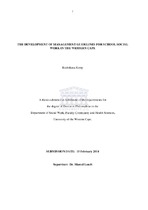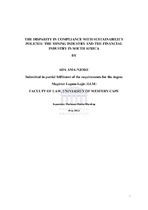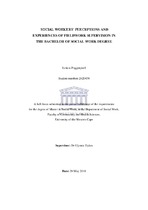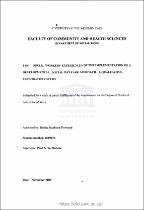| dc.description.abstract | The significant increase of social problems experienced by youth such as, teenage pregnancy, child abuse, child sexual offenses, substance abuse and violence impacted adversely on optimal development including learning, retention and throughput within the school context. These social and psychological barriers to learning are commonly addressed by social workers in the course of their work with individuals, families and communities. Therefore it was a natural progression to consider the appointment of social workers in the Western Cape Education System to address the challenges presented by these problems. The practice of school social work has subsequently become essential within the Department of Education. Service delivery in the Western Cape Education
Department is centralized and school social workers fall under the auspices of circuit teams with school psychologists, learning support advisors, curriculum advisors and other education officials. This multidisciplinary team is managed by circuit team managers who do not necessarily have training in the disciplines of the respective professionals in their team. This system is called the matrix management system and implies a dual management approach in which health professionals e.g. school social workers, also
report to the Head of Specialized Learner and Educator Support (HSLES). The dual or matrix management of school social workers includes a circuit team manager and an “acting senior school social worker.” This study focused on assessing the realities of school social workers being managed under this system and sought to develop guidelines for the management of school social workers. To this end, the present study was conceptualized as Intervention Research within a modified Design and Development
model. This form of applied research is used to design and develop interventions to improve social problems using participatory methods.
The modification entailed four phases where each phase consisted of operational steps. The first phase focused on project planning that included problem analysis and information gathering as operational steps. This phase aimed to formulate the core problem or focus of the research through rigorous contextualization within the current body of literature on School Social Work and empirical validation using key informants including school social workers. Subsequently document analysis of literature and
policies; as well as thematic analysis of interviews and focus groups were conducted. The results informed the core problem or focus for the research. The resultant finding was that dual management impacted negatively on staff morale, professional development, coordination of services, effective service delivery and more broadly posed ethical dilemmas where practices were not aligned to statutory requirements and policy prescriptions of the South Africa Council of Social Workers. The second phase, Design and development, focused on developing a set of management guidelines that would address the problems reported in the experiences of school social
workers, specifically related to the dual or matrix management. During this phase data collection included a survey of SSWs, and interviews to inform the management guidelines along with the findings from Phase one. The third phase, Development and Evaluation, focused on testing the proposed guidelines for feasibility and relevance to the problems encountered in a focus group with SSWs. The core findings suggested that SSWs welcomed the statutory base for their work or scope and the explicit recommendations for line management. The participants also responded favorably to the intention, content and recommendations included in the draft guidelines. Clear recommendations were made that were incorporated into a revision of the management guidelines. The evaluation was participatory and resulted in valuable feedback that refined and modified the management guidelines for school social workers. The fourth phase, Dissemination, focused on presenting the iterative process of the
research and how the core findings in each phase culminated in the management guidelines. For the purposes of the thesis, dissemination entails the formalized presentation of the development and evaluation process of the guidelines in the form of a doctoral dissertation. Appropriate summative comments are made with clear recommendations for the possible adoption of the guidelines in practice that would enable advanced evaluation in field testing. | en_US |




